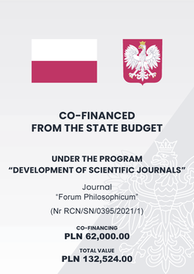- Home »
- Issues »
- 14/2 - Fall 2009 »
- Articles »
The Modern Synthesis: Einstein and Kant
Abstract
The paper discusses the Kantian legacy in modern views about scientific theories. The aim of this paper is to show how Einstein's philosophy of science, which was inspired by his physics, offers a specialized version of the Kantian synthesis of Empiricism and Rationalism. In modern physical theories (relativity and quantum theory) Kant's a priori conditions become “constraints,” as shown in Einstein's use of principle theories. Einstein's use of principle theories shows how constraints are used to steer the mapping of the rational onto the empirical elements of scientific theories.
Keywords
Cite this article
Weinert, Friedel. “The Modern Synthesis: Einstein and Kant.” Forum Philosophicum 14, no. 2 (2009): 193–216. doi:10.35765/forphil.2009.1402.17.
Bibliography
Bennett, Jonathan. Kant's Analytic. Cambridge: Cambridge University Press, 1966. Brittan, Gordon G. Kant's Theory of Science. Princeton, NJ: Princeton University Press, 1978. Cassirer, Ernst. Determinism and Indeterminism in Modern Physics: Historical and Systematic Studies of the Problem of Casuality. New Haven: Yale University Press, 1956. DiSalle, Robert. Understanding Space-Time: The Philosophical Development of Physics from Newton to Einstein. Cambridge: Cambridge University Press, 2006. Einstein, Albert. “Autobiographisches / Autobiographical Notes.” In Albert Einstein: Philosopher-Scientist, edited by Paul Arthur Schilpp, 1:2–94. La Salle, IL: Open Court, 1949. Einstein, Albert. “Considerations Concerning the Fundaments of Theoretical Physics.” Nature 145 (1940): 920–924. Einstein, Albert. “Ernst Mach.” Physikalische Zeitschrift 7 (1916): 101–104. Einstein, Albert, and Leopold Infeld. Evolution of Physics: The Growth of Ideas from the Early Concepts of Relativity and Quanta. Cambridge: Cambridge University Press, 1938. Einstein, Albert. “Ideas and Opinions: Based on Mein Weltbild.” Edited by Carl Seelig. Translated by Sonja Bargmann. London: Alvin Redman, 1954. Einstein, Albert. Mein Weltbild. Edited by Carl von Seelig. Frankfurt; Berlin; Wien: Ullstein, 1977. Einstein, Albert. “Newtons Mechanik und ihr Einfluß auf die Gestaltung der theoretischen Physik.” Die Naturwissenschaften 15 (1927): 273–276. Einstein, Albert. “On the Generalized Theory of Gravitation.” Scientific American 182 (1950): 341–356. Einstein, Albert. “Physics and Reality.” Journal of the Franklin Institute 221, no. 3 (1936): 348–382. Einstein, Albert. “Prinzipien der Forschung: Rede zum 60. Geburtstag von Max Planck.” In Mein Weltbild, 107–110. Amsterdam: Querido, 1934. English edition: “Principles of Research.” In Ideas and Opinions: Based on Mein Weltbild, edited by Carl Seelig, translated by Sonja Bargmann, 224–227.New York: Crown Publishers, 1954. Einstein, Albert. “Quantenmechanik und Wirklichkeit.” Dialectica 2 (1948): 320–324. Einstein, Albert. Relativity: The Special and the General Theory. Translated by Robert W. Lawson. London: Methuen, 1920. Einstein, Albert. “Remarks on Russell’s Theory of Knowledge.” In The Philosophy of Bertrand Russell, edited and translated by Paul Arthur Schilpp, 278–291. New York: Tudor, 1944. Einstein, Albert. “Reply to Criticisms.” In Albert Einstein: Philosopher-Scientist, edited by Paul Arthur Schilpp, 2:665–688. La Salle, IL: Open Court, 1949. Einstein, Albert. The Meaning of Relativity. Four Lectures Delivered at Princeton University, May, 1921. Translated by Edwin P. Adams. London: Methuen, 1922. Einstein, Albert. “The Theory of Relativity.” In Essays in Physics, 5–12. New York: Philosophical Library, 1950. Einstein, Albert.“Was ist Relativitätstheorie?” London Times, November 28, 1919. English edition: “What Is the Theory of Relativity?” In Ideas and Opinions: Based on Mein Weltbild, edited by Carl Seelig, translated by Sonja Bargmann, 227–232. New York: Crown Publishers, 1954. Einstein, Albert. 1933, “Zur Methodik der theoretischen Physik.” In Mein Weltbild, Amsterdam: Querido, 1934. English edition: “On The Method of Theoretical Physics.” In Ideas and Opinions: Based on Mein Weltbild, edited by Carl Seelig, translated by Sonja Bargmann, 270–276. New York: Crown Publishers, 1954. Fine, Arthur. The Shaky Game. Einstein, Realism and the Quantum Theory. Chicago: The University of Chicago Press, 1986. Friedman, Michael. Kant and the Exact Sciences. Cambridge, MA: Harvard University Press, 1992. Friedman, Michael. Reconsidering Logical Positivism. Cambridge: Cambridge University Press, 1990. Gardner, Sebastian. Kant and the Critique of Pure Reason. London: Routledge, 1999. Hagar, Amit. “Length Matters.” Studies in History and Philosophy of Modern Physics 39 (2008): 535–556. Heisenberg, Werner. Physics and Philosophy. London: Allen & Unwin, 1958. Howard, Don. “Was Einstein Really a Realist?” Perspective on Science 1 (1993): 204–251. Kant, Immanuel. Critique of Pure Reason. Translated by Norman Kemp Smith. London: Macmillan 1963. Kant, Immanuel. “Der Streit der Fakultäten.” In Immanuel Kant Werkausgabe, edited by Wilhelm Weischedel, vol. 11, Schriften zur Anthropologie, Geschichtsphilosophie, Politik und Pädagogik, 267–393. Frankfurt: Suhrkamp 1979. Kant, Immanuel. “Metaphysische Anfangsgründe der Naturwissenschaft.” In Immanuel Kant Werkausgabe, edited by Wilhelm Weischedel, vol. 9, Schriften zur Naturphilosophie, 7–135. Frankfurt: Suhrkamp 1979. Körner, Stephan. Kant. Baltimore: Pelican, 1955 Miles, Murray. “Kant’s ‘Copernican Revolution’: Toward Rehabilitation of a Concept and Provision of a Framework for the Interpretation of the Critique of Pure Reason.” Kant-Studien 97 (2006): 1–32.




